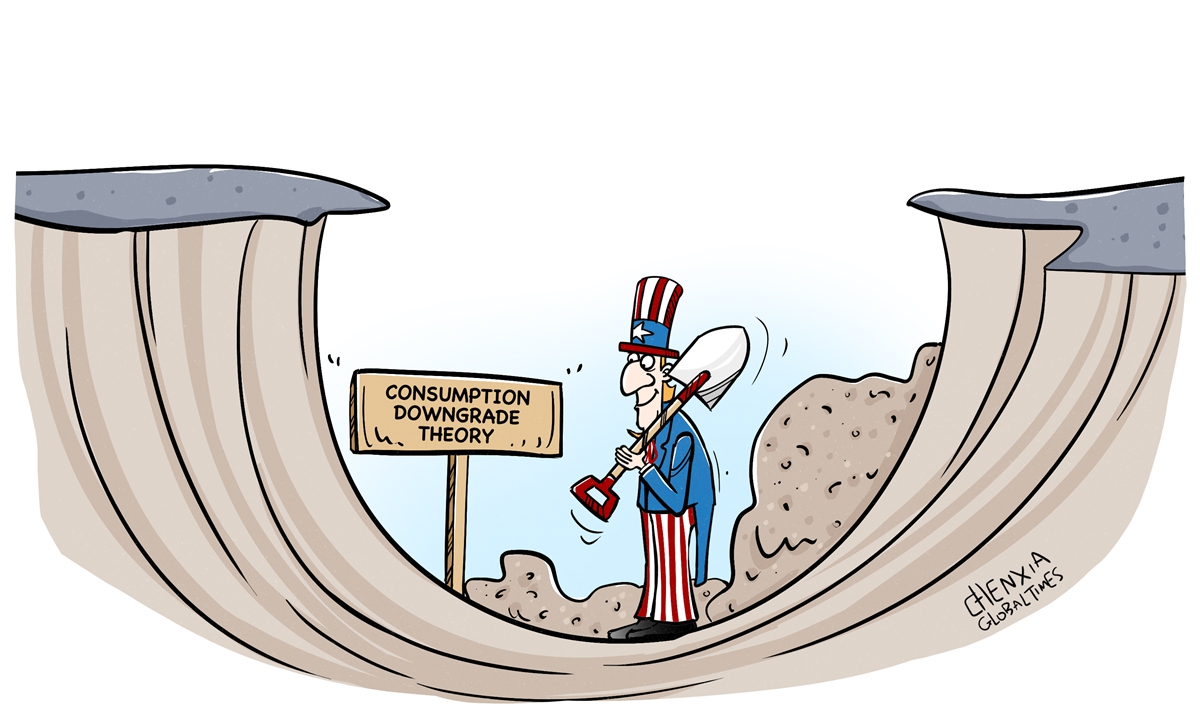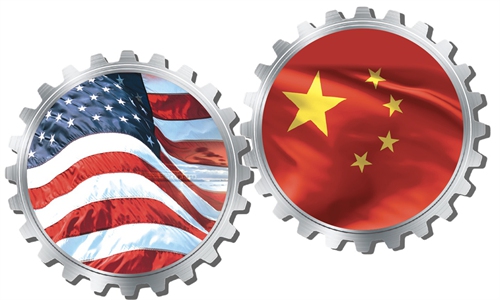
Illustration: Chen Xia/Global Times
Predicting the downfall of the Chinese economy has been a longstanding pastime for some in the Western media, and now, their focus is on consumption. An interesting phenomenon is unfolding: Chinese have consumed more, but talk of a so-called consumption downgrade has emerged synchronously. Clearly, there is an inherent contradiction between consumption growth and the so-called downgrade.The latest example is an article from Reuters, issued on Monday under the headline "More Chinese seek bargains at Beijing market as confidence in economy wanes." The so-called consumption downgrade narrative has emerged once again as some Western media have been hyping the false proposition of how China's middle class will hit a brick wall amid "economic uncertainty."
The Chinese economy is indeed facing challenges. Some are temporary problems during economic transformation amid post-pandemic recovery and others are caused by global economic headwinds. However, it is imprudent to equate them all as high risk and forecast "a collapse of the Chinese economy."
At present, as a matter of fact, some consumers lack confidence and have many concerns. Chinese policymakers have noticed this. The authorities have rolled out targeted measures to boost domestic consumption. Such supportive measures are crucial to improving market expectations, enhancing consumer confidence and lifting domestic demand, and will, along with a slew of measures in other areas such as boosting employment and income growth, ensure steady economic recovery in the second half of 2023.
The Reuters' article describes a consumer surnamed Zhang who used to buy branded fashion from shopping malls, but now China's "economic uncertainty" has driven the 35-year-old teacher to shop at one of Beijing's most famous wholesale markets. Zhang's story may be true, but this is not the whole picture of China's economy. In the first seven months, the total retail sales of consumer goods reached 26,434.8 billion yuan ($3,625 billion), up by 7.3 percent year-on-year. The retail sales of services jumped by 20.3 percent year-on-year during the same period.
It's a hard-earned result amid the global economic downturn. According to advance estimates, total retail and food services sales in the US amounted to $696.4 billion in July, up only 0.7 percent from June and 3.2 percent from July 2022.
China remains a bright spot across the global economic landscape. But, in some Westerners' eyes, China's economy "is going through a rough patch." It's a little bit ironic. It's best for these Westerners to handle economic problems in their own countries first. If they care about the Chinese economy, at least they should have a clear understanding of China.
Some Chinese consumers who can afford to spend more may join the so-called bargain-hunters, but this does not necessarily mean their consumer spending will decrease. The term "consumption downgrade" is inaccurate. Chinese society is experiencing a consumption upgrade in which consumers have increasingly shifted to services, which improve their lives. In this process, Chinese consumers pay more attention to consumption such as tourism, personal interests, and education.
Jay Chou, a renowned singer and songwriter, held several concerts in North China's Tianjin from September 7 to 10. When tickets went on sale in July, nearly 130,000 of them were snapped up within 30 seconds on Damai, China's leading online ticketing platform for live events. It is estimated that the concerts in Tainjin directly and indirectly promote consumption worth 3 billion yuan, according to media reports. It offers a window to observe China's consumption potential.
In many Chinese cities, especially first- and second-tier ones, the growth of services consumption has surpassed the consumption of goods while the focus of consumption has increasingly shifted from material to spiritual or experiential. Service-oriented consumption has become a new trend in the world's second largest economy. However, it is regrettable that some Western commentators are still keen on hyping up the so-called consumption downgrade, which may lead them to miss out on the opportunity brought by China's emerging opportunities.
China's consumption opportunities should be cherished, not blamed. For instance, China's outbound tourism has continued to recover, with 593,100 tourists departing from the capital city of Beijing in July, up 38.75 percent month-on-month. Hopefully some Westerners can give up their prejudice against the Chinese economy and embrace the opportunities China provides.
The author is a reporter with the Global Times. bizopinion@globaltimes.com.cn



